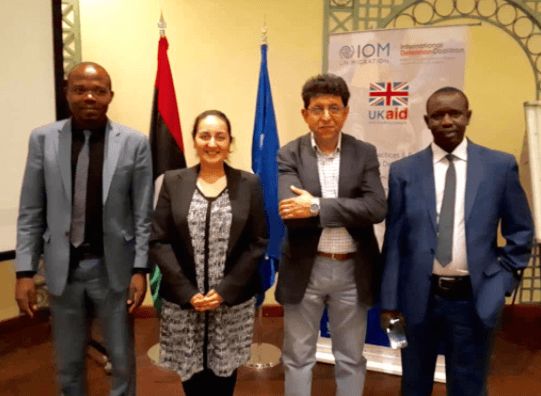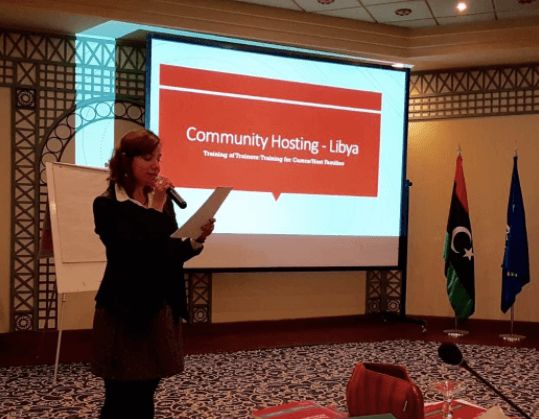On the Ground in Libya: Implementing Alternatives to Detention
Written by Jerome Phelps, June 2019
Former Executive Director, International Detention Coalition (IDC)
ALSO AVAILABLE IN: Spanish — French — Arabic
Migrants are undertaking journeys through some of the most dangerous countries on earth. In countries deep in conflict, where everyone faces the risk of indiscriminate violence, migrants are often at the greatest risk. They look different, they are unfamiliar with the environment and they may not have safe housing – additionally, they face the threat of detention, often with no time limit, in appalling conditions.
Maryam’s husband lives in Europe, but he wasn’t able to send back enough money to support Maryam and their two-year old daughter. Maryam then made the decision to leave her home with their child, and travel across the Sahara, towards Europe. Maryam knew she was risking everything to pursue her dream of a better life.
Maryam’s dream turned into a nightmare. She spent the last of her money boarding a boat for Italy, but within a few hours of leaving Libya they entered heavy seas. Maryam fell onboard and was seriously injured. She was rescued by the Libyan Coast Guard, and narrowly avoided joining the 289 migrants who have died in the Mediterranean Sea already in 2019. When she reached the shore and received treatment, she was told that she would be permanently disabled. And then, she was detained.
Migrants face the threat of detention, often with no time limit, in appalling conditions.
Libyan detention centres have been widely criticised. Libya is once again racked by civil conflict, yet 670,000 refugees and migrants were estimated to be in the country in 2018 – picked up at sea, in the desert or in towns and cities.
The need for alternatives to detention in Libya is urgent, yet the challenges are massive. If migrants are released to the street, they face a real risk of kidnapping, exploitative labour and violence. But if there is no prospect of release, they can face indefinite detention.
Libya is still so dangerous that our staff members can’t travel there – as a small international NGO, we can’t get insurance to work there, as most governments advise against all but the most essential travel. So in February, we travelled to Tunis instead to run a six-day training session for a group of Libyan and sub-Saharan African humanitarian professionals. The participants are working on the ground everyday in Libyan detention centres, and represent various United Nations agencies and aid organisations. We facilitated sharing and exchange about their day-to-day work implementing alternatives to detention in Libya, which was a few hundred miles and an unimaginable distance along the Mediterranean coast from where we were in that conference room in Tunis. These humanitarian professionals get people like Maryam to safety.

The International Organisation for Migration (IOM) has been running a community programme to enable the most vulnerable migrants to be released to trained host households. This programme is able to support migrants to live safely in the community. IOM also runs a shelter (at one stage in partnership with one of our members) for larger numbers of migrants. Despite the renewed conflict in Tripoli, the work continues.
IDC has been supporting IOM to develop these programmes and their wider strategy. This collaborative work includes developing training and procedures, based on best practices that have been engaged elsewhere in the region and globally, and documented in our research.
The challenges, complexities, and the risks to personal safety are infinitely greater than I was used to in my previous job, which was implementing alternatives in the United Kingdom. However, the core purpose is the same – to get people out of detention, and into community placements that meet their specific needs. And to ensure that people are given the agency to make their own decisions about their own futures, no matter how difficult the options.
During the training, we talked about the need to take a long view of the difficulties the participants are facing: developing and expanding alternatives to reduce detention has generally taken at least several years. We also talked about managing physical and mental health challenges, and how hosts can make their heavily traumatised guests feel safe and at home after such hardship. I learnt that, if your guest is unable to even think about what they would like to eat for dinner, you can start by asking them which cup they would like to use.

IDC is in no position to implement alternatives in all the places that they are so urgently needed, particularly in extremely complex contexts, such as Libya. We need to partner with United Nations entities like IOM and other organisations that are able to work on the ground with people at risk of detention. We need to capture learnings from the work in Libya, and help IOM and others build on and expand alternatives. This work is a critical part of how we will reduce detention overall. Maryam and her child were identified by IOM as among the most vulnerable of all the migrants in the overcrowded detention centres that they have access to. After much negotiation and overcoming many logistical hurdles, Maryam and her daughter were released from detention to live with a host family. Their hosts were fellow migrants from her region who had been living in Libya for over a decade.
Maryam spent three months with her host family. There she began her recovery from trauma, and adjusted to her new reality of being a young mother living with a physical disability. Despite everything, she seriously considered risking another boat journey to Europe, since there was no option to regularise her stay and establish a life in Libya. Ultimately, Maryam made the decision to return to her mother’s home in her country of origin. It was her access to safety and support that allowed her to start the process of recovery and weigh her options, because she was no longer only focused on survival while facing daily trauma and hunger in detention.
Despite the situation in Libya, the majority of African governments have consistently pushed back against European pressure to invest in detention infrastructure and heavier border control. These measures have not been seen as a solution to the European perception of a ‘migration crisis’. In the negotiations for the Global Compact on Migration last year, African States’ Common Position consistently referred to the need to explore and implement alternatives.
In reality, the sheer numbers of people who are on the move in the region make mass detention on that scale simply impractical, as well as harmful. As a result, African States are and will remain at the forefront of exploring alternatives to detention.